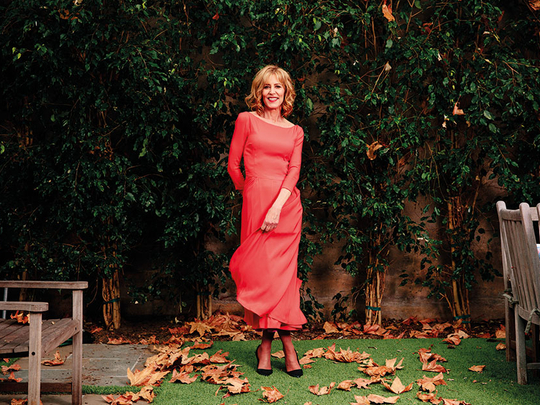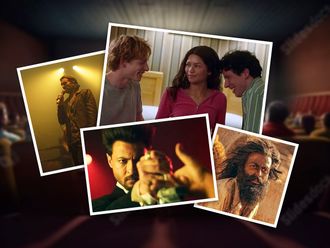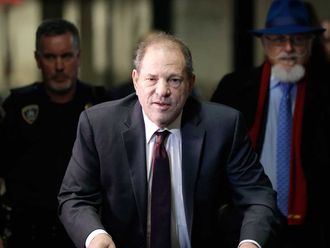
In her airy, antiques-filled loft in Greenwich Village, Christine Lahti is trying to fight her way out of a box. Her hands pat the empty air in front of her. Then, quickly, she clutches that pesky invisible kite, but it’s getting away from her ... whooooaaaa! I’m waiting for the third move in her arsenal, but I think we’ve exhausted the possibilities. She is not very good at this.
“I really thought I could generate some income being a mime,” she says, recalling one tale in her new collection of essays, True Stories From an Unreliable Eyewitness. This was in 1973, before the awards — the Oscars, the Emmys, the Golden Globes and the Broadway accolades — before America discovered this actress of quirky beauty, intelligence and wit.
All of that would come later. But that day in Central Park, Lahti made $3.35 (Dh12.3). Mime career over. Lucky for us.
True Stories started as readings performed onstage, and became a loosely connected series of essays about family, Hollywood, aging and, most of all, how these life moments charted her evolution as a feminist. It is by turns funny, touching and self-revelatory, and not in a typical actress humble-braggy way: She can tell stories about herself that are truly toe-curling. Did she really approach a random stranger and ask to be relieved of her virginity? (You can imagine how well that went.)
The 68-year-old actress is at her New York City home while her husband, director Thomas Schlamme, is filming The Americans in Brooklyn. We spoke about the book on a brilliant snowy day, as dozens of candles flickered around us and her S&M rope dangled from a rafter. (That is what she called it. It is in fact an art installation. She is no less mischievous in person than on screen.) Below is a condensed version of our conversation.
Every mother will appreciate how one of the finest stage actresses of her time was told by her children that her voice was disgusting, and forbidden from singing and dancing in front of them. You write: ‘Until the little control freaks go off to college, you will be in a song-and-dance straitjacket.’
I had to go full-awkward, because so much of what is imperfect about me is awkward and embarrassing — and hopefully funny.
Your book seemed to start off as a traditional memoir, and then it morphed into something else — an awakening of sorts that centres on what it means to be a first-wave feminist. Is that what happened?
I started writing, not knowing what it was going to be. My daughter was sick of me complaining about, you know, ‘There’s no jobs for women over 50, I didn’t know there was a shelf life for actresses.’ Obviously, I was a little naive. And she said, ‘Stop complaining, stop being dependent on men hiring you, and write some of your stories down.’
This book is largely about how you evolved as a feminist, which included the rejection of the family model you grew up with: doctor dad beloved by his patients but remote to his family; mother who was sort of an iconic 1950s housewife ...
... who I judged so harshly. I think she was a product of that internalised misogyny many women feel, but after her kids left the house she had another life — she became a professional painter, and a pilot. None of us have to be stuck.
You recount stories of Broadway and Hollywood that remind us of why the #MeToo movement was inevitable — for example, the day a casting agent assured you a role, when all you had to do was get intimate with the directors. Did he really say it that casually?
Yes, as if it was an understood thing that I would automatically do that. It wasn’t even couched in a joke or an apology. It was really just, ‘Yeah, here’s what you have to do.’
It was something that we all back then just knew we had to navigate through. And it sounds benign; it’s not like they even touched me. But these experiences aren’t benign. I think that they break you in some way. Especially when I was young, and I was full of hope and optimism about my worth as a human being and my talent as an actress. All that was disregarded. It dehumanised me in a way that devastated me.
But that story was very telling. You walked home 75 blocks raging, vowing no one would ever treat you that way again.
And by the time I get home and some man I want to see calls and asks me out, I can’t go because I feel like I weigh five pounds too much. That sort of sums up a lot of stuff about how women go through life.
Did you still feel vulnerable, even after you got more power in your career? How did you cope with unwanted attention?
Early on in my career, if I wanted the job, I would giggle and flirt back, because I wanted the job. But I would leave feeling dirty and disgusted with myself and powerless — and dehumanised. But I never had anyone go so far that I would have to say, ‘No,’ and, ‘Zip up your zipper.’ Maybe I was tall and a little scary or something.
You talk a lot about ageing in Hollywood, and you write wonderfully about your own struggles about getting plastic surgery: the appointments with the doctor, the breaking of appointments. And you leave us with a cliffhanger. What did you do?
I haven’t done it yet, but the jury’s still out. Yeah, you know, I see cutting, and that’s all I see on the screen. I see people with face-lifts, and I’m almost just looking at, OK, wow, that’s a pretty good one. Oh, but her lips aren’t quite right. I’m looking at the ‘work’, not the acting. I don’t think I’ve ever seen one that you can’t tell.
It’s a lot of pressure to resist. How many women in Hollywood haven’t had stuff done?
I think I’m the only one! [Her publicist emails later, to make it very clear that she was joking.] And by the way, I’m not judge-y about anybody who does it, because I still might. It’s just that I resent the pressure to do it. I resent the need women feel to stay young to be relevant. I resent all that. And I want, somehow, to be valued for other things. I still want that.
You won an Academy Award for directing your 1995 short film, Lieberman in Love. What do you want to be doing now?
I want to either direct or act in movies about women. That’s what I want to do. I have a couple of scripts I want to direct. And I have a series that I’m developing about an older woman — everyone wants to put her out to pasture — who’s trying to find a way. She fights valiantly, and sometimes foolishly, to stay visible. It’s a half-hour dramedy.
Many of us want to see more of you onscreen. And P.S., before I go, can I just say you offer one of the greatest acting tips of all time?
I do?
When you hate someone you’re working with. ‘Sometimes when I have to look adoringly into someone’s eyes, I imagine they’re the eyes of Nellie, my golden retriever.’
Oh yes! It works. And I’m sure the ones who hated me thought about their dog, or maybe their favourite sports team.












